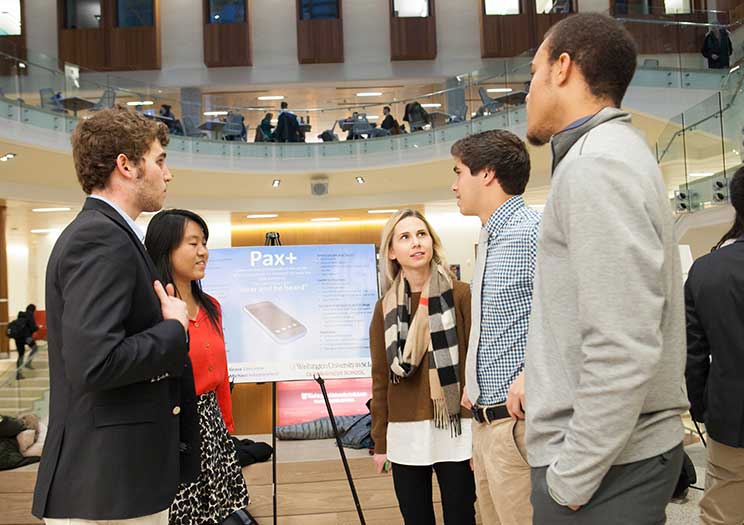
Olin students heading to class
Washington University, Olin Business School
The best want to surround themselves with the best. They need to be exposed to new ideas, always looking to learn and never content with the way things are. That means finding people who share their values and commitment — and aren’t afraid to push them.
The Olin Business School is one community that gathers the best-of-the-best. Five years ago, Olin ranked as the top business school in the country in P&Q’s inaugural undergraduate business ranking. This year, the school has momentum on its side as it climbed from #12 to #4. You can credit admissions in part. After all, the school ranked as the 3rd-most selective business school in the country, a magnet for top high school talent looking to make an impact around other high potentials.
Take incoming freshmen. They averaged a 1523 SAT. That’s a 12 point increase over the previous year — and ranks 2nd overall among 83 programs surveyed by P&Q. Collectively, the class also produced a 33.8 average ACT, good for 4th in the country, along with a 4.22 undergraduate GPA. On top of that, the school slashed its acceptance rate by nearly six points to 8.36%.
That’s pretty elite company!
Sure enough, employers have taken note. Last year, 100% of Olin students seeking a business-related internship landed one. Better still, the school placed 97.67% of 2020 grads, who pulled down starting average compensation of $82,339.
Did I mention that Olin achieved gender parity with its incoming class this fall?

Olin Business School students
Entrepreneurship is one hallmark of the Olin experience. At the MBA level, Olin has consistently ranked as the top entrepreneurship program in the world. That enthusiasm and expertise filters down to the undergraduate ranks. One example is Ayana Klein, whose 3DuxDesign solution is geared to use cardboard to teach STEM principles to children. A senior, Klein credits Professor Doug Villhard with helping her punch up her pitch, one that nabbed a first place prize in an investor pitch competition. She is equally enthusiastic about the coursework, touting The Hatchery, a startup-building course that mixes undergraduates and MBAs.
“On the first day of class, every student has the opportunity to pitch a business idea, so I pitched 3Dux and proceeded to network with my class peers and built a group where we would put together a full-length, formal business plan and investor pitch throughout the semester,” she tells P&Q. “I thought this course was one of the most valuable business courses I have taken as I was able to experience 3DuxDesign from a new dimension. As a sibling-run company, my brother and I are often working inside our own bubble. Learning to work with other students and professionals and take constructive feedback from my peers, professors, and industry experts has been invaluable.”
Like the best business programs, Olin also differentiates itself through a wide range of hands-on projects in its courses and extracurricular activities. One example is the Taylor Community Consulting Program, where student teams take on six-week community projects that help them sharpen their research, problem-solving, finance, and strategy planning skills.
“There were many experiential learning projects in multiple classes,” adds a P&Q survey respondent from the Olin Class of 2019. “These were fantastic to prepare to the real world as they brought in real world clients! These projects really prepared us for the business world when it comes to presentations and answering/anticipating key stakeholders questions.”
This month, P&Q reached out to Mark P. Taylor, the Dean and Donald Danforth Jr. Distinguished Professor of Finance at Olin. From career services to alumni engagement, here are Taylor’s thoughts on what makes Olin a business school to watch in 2022.
5 QUESTIONS WITH MARK P. TAYLOR
P&Q: What are our two biggest strengths, and how do we make students better prepared for business once they graduate?

Dean Mark P. Taylor
Taylor: “At WashU Olin, we emphasize collaboration, developing strong skills through team projects in required Olin courses. In their first semester, students are placed on a management team where they learn about team development, working and leading within diverse teams, and navigating conflicts as the group strives to complete a deliverable (team presentation) in their very first business course. Group work continues in nearly all our required courses. We also prioritize second-year students’ client project in Olin’s required Management Communication course. By this point, they’re already well-practised in navigating team dynamics, and they’re ready for collaboration in the workplace.
As a program that prioritizes business courses from the start of each student’s experience, our faculty members are key to better preparing students after they graduate. The faculty at Olin know every student by name and story—and our faculty members are world-class researchers and industry practitioners. They excel at bringing real-world perspectives and academic insights into the classroom.”
P&Q: What are some new or upcoming developments in our program that will enhance the business program for future business majors?
Taylor: “WashU Olin’s undergraduate program has always prioritized global experiences and fostered a culture that encourages study abroad and engagement with international businesses. Indeed, up to now, more than 60% of Olin undergrads have engaged in a global experience. We’ve doubled down on that emphasis with a new global mindset degree requirement for undergraduates starting with the class of 2025. The degree requirement aligns with Olin’s determination to develop multicultural awareness, communication skills, and an appreciation of what it means to lead globally. An emphasis on this global mindset will be infused throughout students’ academic and extracurricular activities across their four years. Students can satisfy this requirement through global experiences that include more than 20 semester-long and short-term programs. Even students whose academic journey won’t support a global experience can satisfy the requirement through a domestic journey, specialized academic coursework and cultural engagement.”
P&Q: At WashU Olin, 97.67% of our 2020 class landed full-time employment and 100% had business internships. What career services, classroom or extracurricular programming gives our students an advantage in the marketplace?
Taylor: “Every Olin degree student has a designated career coach who works with them exclusively from the start and throughout their four-year degree journey. Their coach assists with everything from exploring career options to polishing career tools (resume, LinkedIn profile) to researching and interviewing for internships and full-time jobs. That partnership becomes highly structured in the student’s second year, with career education integrated into a required course, Management Communication. Olin’s Weston Career Center offers career programming throughout the year, connecting students to third- and fourth-year peers and alumni in specific industries. Meanwhile, a variety of undergraduate student organizations collaborate with the WCC to prepare members for interviews or to make alumni connections. Examples include the Olin Business Council, any one of three business fraternities, WU Investment Banking Association, Women in Finance, WU Consulting Association, and the Business of Sports Society, to name a few.”

Olin team preparing for a presentation
P&Q: When alumni look back on their time at Olin, what would they consider to be their signature experience? How does it bring the best of the best of the Olin experience together?
Taylor: “Our alumni often tell us how much they value the real-world experience they received as undergraduates. Experiential learning is one of four pillars of excellence for WashU Olin, and we lean hard into that culture with numerous high-impact academic activities, including participation in projects through our Center for Experiential Learning, study abroad, opportunities to serve as faculty teaching assistants, internships, academic research projects, and leadership in student organizations. Our approach is tailored to students’ goals and talents, recognizing and respecting the varied paths and opportunities students may choose. The common theme for a WashU undergrad focuses on high community engagement.”
P&Q: WashU Olin’s undergraduate admissions rate is 8.36%. What two key qualities must prospective students possess to land a spot in our program? What two things can prospective students do to enhance their odds of landing a spot at Olin?
Taylor: “WashU Olin is academically rigorous. Strong high school preparation is a must. Prospective students should take the most challenging curriculum their high school offers in which they can succeed. Specifically, a strong quantitative background, including calculus, is important to academic success at Olin.
Prospective students should also demonstrate their potential to be a business leader prepared to change the world, for good. In their application, prospects should help us understand the unique qualities and potential they would bring to our program and community. Highlight their involvement in or commitment to high school activities, clubs, sports, music, theater, arts, community or entrepreneurial endeavors. Share their achievements. Describe their passions. Their college essay should introduce us to their special qualities and potential.”
Next Page: Villanova University School of Business











Questions about this article? Email us or leave a comment below.